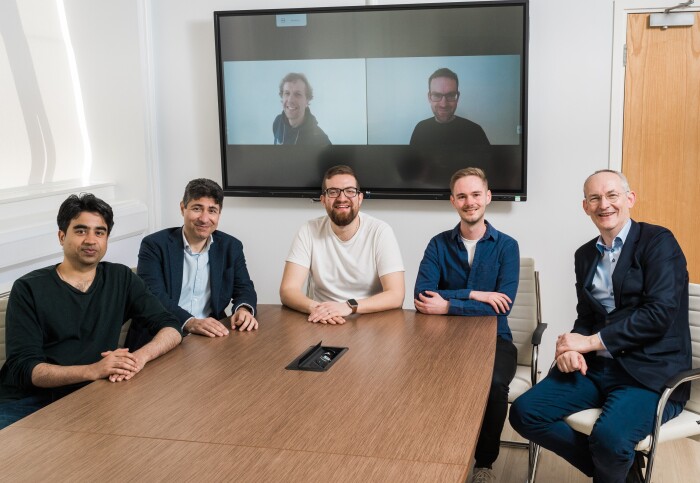Quaisr raises $3.1 million to develop digital twins for industry
by Ian Mundell

Here to grow: part of the current Quaisr team.
The funding round will help the tech startup expand its team and drive forward product development.
Quaisr, a startup created by researchers from Imperial and the Alan Turing Institute in London, has raised $3.1 million to further develop its work on digital twins. The money will be used to expand the team, with a focus on software engineering and business development.
“Our top priority is to determine product-market fit, and to do so we need people to be focused on product development while we obtain valuable feedback from our customers,” says Dr Assen Batchvarov, the company’s product manager.
Quaisr was set up in 2020 by Imperial and Turing researchers Professor Richard Craster, Imperial’s Dean of Natural Sciences, Professor Omar Matar, Head of Imperial’s Department of Chemical Engineering, Dr Indranil Pan, and Dr Lachlan Mason. The team is expected to grow to a dozen full time members over the next couple of quarters.

The pre-seed funding round was led by Crane Venture Partners, with the participation of Acequia Capital, Hybris Founder Carsten Thoma, Encord Founder Eric Landau and additional strategic angel investors.
Twins for industry
A digital twin is a virtual representation of an object or system that can be updated from real-time data. This can then be used to monitor and predict the performance of the object or the evolution of the system under different conditions, to help decision-making or inform further research and development.
 Apart from applicability in operations, using a digital twin can significantly shorten the discovery cycles for new materials, for example, or help optimise the performance of physical systems, such as manufacturing lines or chemical production facilities, in real-time.
Apart from applicability in operations, using a digital twin can significantly shorten the discovery cycles for new materials, for example, or help optimise the performance of physical systems, such as manufacturing lines or chemical production facilities, in real-time.
However, connecting, scaling and democratising the building blocks that represent digital replicas of assets and processes is time-consuming and resource-intensive. Frustrated by limitations of the tools available, the Quaisr founders set out to develop an easier and more cost-effective approach that enables multinationals to harness the power of digital twins.
The Quaisr platform will empower heavy industries to build reliable digital twins of their assets and processes, making their operations efficient, sustainable and more reliable. Dr Assen Batchvarov Quaisr
The result is a platform that can leverage cloud technologies or on-premises infrastructure (depending on client requirements) so that domain experts can focus on improving and connecting their models and simulations instead of navigating IT infrastructure, security, authentication and writing non-standardised ‘glue’ code.
“The Quaisr platform will empower heavy industries to build reliable digital twins of their assets and processes, making their operations efficient, sustainable and more reliable,” says Dr Batchvarov.
Quaisr is currently taking part in Aerospace Xelerated, an accelerator run by Boeing, and recently announced a materials discovery partnership with security and defence company QinetiQ.
Article text (excluding photos or graphics) © Imperial College London.
Photos and graphics subject to third party copyright used with permission or © Imperial College London.
Reporter
Ian Mundell
Enterprise